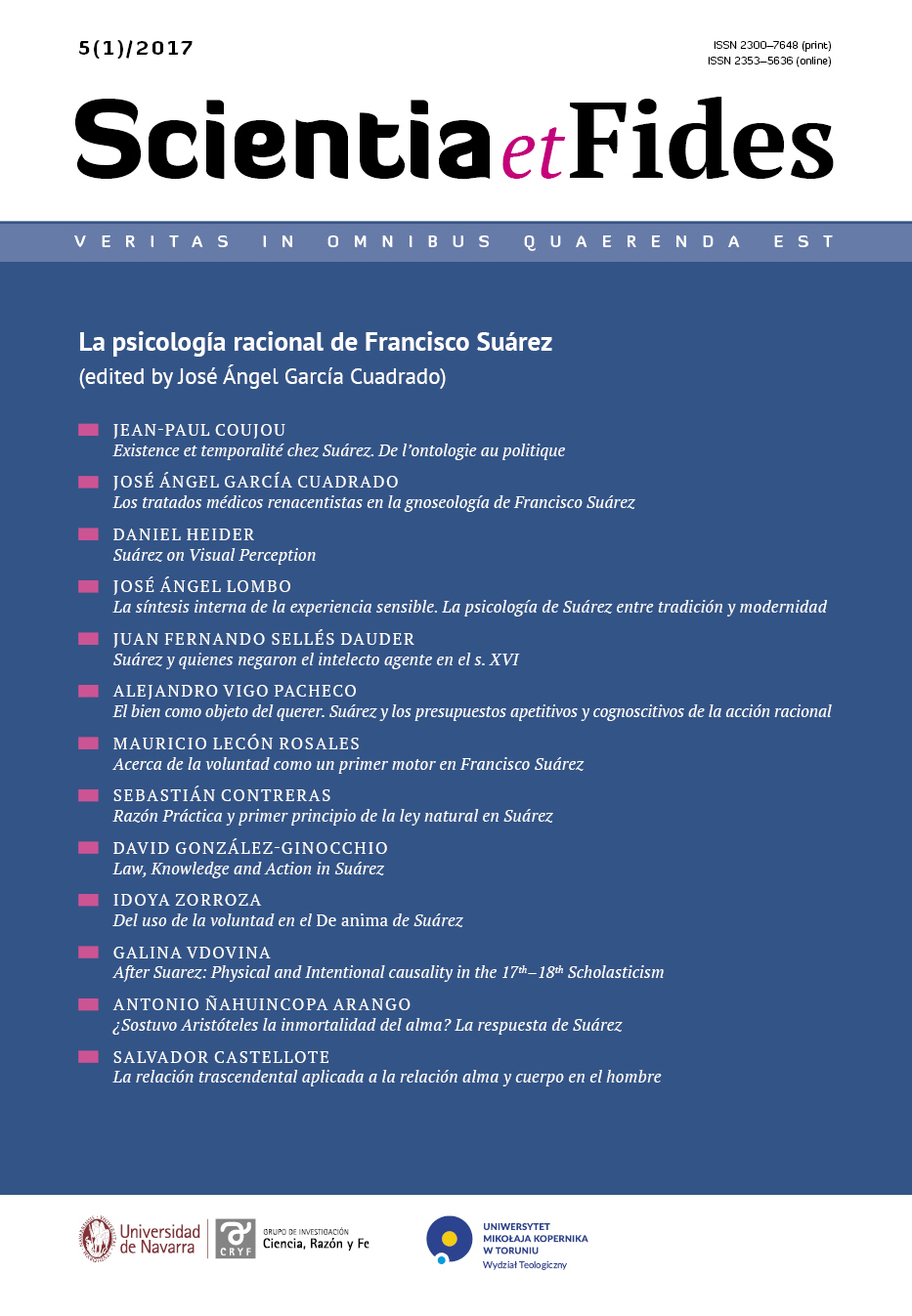After Suárez: Physical and Intentional Causality in the 17th-18th Centuries Scholasticism
Keywords
physical / intentional causality, 17th century scholasticism, Francisco Suárez, influxus intentionalisAbstract
The article investigates the distinction between the physical and the intentional causality that appeared in the 17th century scholasticism in the course of polemics with the traditional Aristotelian classification of causes and with the conception of causality developed by Francisco Suárez. The introduction of the distinction between physical and intentional causation was motivated by the insufficiency of the notion of causality, adopted in ancient and medieval natural philosophy to describe the causal processes in the sphere of conscious human activity. The authors of the 17th century took as a base two concepts carefully elaborated by Suárez, that is, the concepts of influxus and of metaphorica motio, and, starting from them, introduced an additional concept of influxus intentionalis.
References
Arriaga, Rodrigo de. 1639. Cursus philosophicus. Parisiis: Quesnel.
Carraud, Vincent. 2002. Causa sive ratio: La raison de la cause, de Suarez а Leibniz. Paris: Presses universitaires de France.
Caruso, Ester. 1979. Pedro Hurtado de Mendoza e la rinascita del nominalismo nella Scolastica del Seicento. Firenze: La Nuova Italia.
Des Chene, Dennis. 2012. “Suárez on Propinquity and the Efficient Cause.” In The Philosophy of Francisco Suarez, edited by Benjamin Hill/ Henrik Lagerlund. New York: Oxford University Press.
Fink, Jakob L. 2015. “Suárez on Aristotelian Causality.” In: Suarez on Aristotelian Causality, edited by Fink, Jakob Leth. Investigating Medieval Philosophy, vol. 9, 23-42. Leiden: Brill.
Gufl, Veremund. 1750. Philosophia Scholastica Universa: Principiis S. Thomae D. A. Apprime Conformata. Tomus III, Physicam Vniversalem… complectens. Ratisbone: Seiffartus.
Hurtado de Mendoza, Pedro. 1617. Disputationes a summulis ad metaphysicam. Tolosae: Dominicum Bosc.
Juan de Santo Tomás. 1667. De Sacramentis in genere, edited by François Combefis. Parisiis: Antonii Bertier.
Juaniz de Echalaz, Juan. 1654. Сursus philosophicus. Lugduni: L. Arnaud/Cl. Rigaud.
Lezard de Belliquadro, Ambrosius. 1664. Cursus philosophicus ex mira D. Thomae. Tomus IV. Taurini: Bartholomæi Zapatæ.
Locke, John. 1894. An Essay Concerning Human Understanding. Alexander Campbell Fraser (ed.). 2 vols. Oxford: Clarendon Press.
Martínez Hispalensis, Nicolás. 1678. Deus sciens sive de scientia Dei controversiae quatuor scholasticae. Monachii: Typis Sebastiani Rauch.
Mayr, Antonius. 1739. Philosophia peripatetica antiquorum principiis et recentorum experimentis conformata. Tomus II: Physica universalis. La Haye: Joannis Pauli Schleig.
Neri, Johannes Baptista. 1682. Ex universa philosophia. Lycae: Pacium.
Penner, Sydney. 2015. “Final Causality: Suárez on the Priority of Final Causation.” In: Suarez on Aristotelian Causality, edited by Fink, Jakob Leth. Investigating Medieval Philosophy, vol. 9, 121-148. Leiden: Brill, 2015.
Renemann, Michael. 2010. Gedanken als Wirkursachen. Francisco Suárez zur geistigen Hervorbringung (Bochumer Studien zur Philosophie 49). Amsterdam/Philadelphia: John Benjamins.
Richardson, Kara. 2015. “Formal Causality: Giving Being by Constituting and Completing.” In Suarez on Aristotelian Causality, edited by Fink, Jakob Leth. Investigating Medieval Philosophy, vol. 9, 64-83. Leiden: Brill.
Schmid, Stephan. 2015. “Finality without Final Causes? – Suárez’s Account of Natural Teleology.” Ergo: an Open Access Journal of Philosophy, 2: 393-425.
Schmid, Stephan. 2015. “Efficient Causality: The Metaphysics of Production.” In: Suarez on Aristotelian Causality, edited by Fink, Jakob Leth. Investigating Medieval Philosophy, vol. 9, 84-120. Leiden: Brill.
Suárez, Francisco. 2015. Disputationes metaphysicae. http://homepage.ruhr-uni-bochum.de/Michael.Renemann/suarez/
Vdóvina, Galina V. 2015. “The Genesis of the concept of the intentional causality in the European philosophical tradition.” In The Measure of things. The man in the history of European thought, 147-167. Moscow: Akvilon (in Russian).
Downloads
Published
How to Cite
Issue
Section
License
CC BY ND 4.0. The Creator/Contributor is the Licensor, who grants the Licensee a non-exclusive license to use the Work on the fields indicated in the License Agreement.
- The Licensor grants the Licensee a non-exclusive license to use the Work/related rights item specified in § 1 within the following fields: a) recording of Work/related rights item; b) reproduction (multiplication) of Work/related rights item in print and digital technology (e-book, audiobook); c) placing the copies of the multiplied Work/related rights item on the market; d) entering the Work/related rights item to computer memory; e) distribution of the work in electronic version in the open access form on the basis of Creative Commons license (CC BY-ND 3.0) via the digital platform of the Nicolaus Copernicus University Press and file repository of the Nicolaus Copernicus University.
- Usage of the recorded Work by the Licensee within the above fields is not restricted by time, numbers or territory.
- The Licensor grants the license for the Work/related rights item to the Licensee free of charge and for an unspecified period of time.
FULL TEXT License Agreement
Stats
Number of views and downloads: 814
Number of citations: 0



